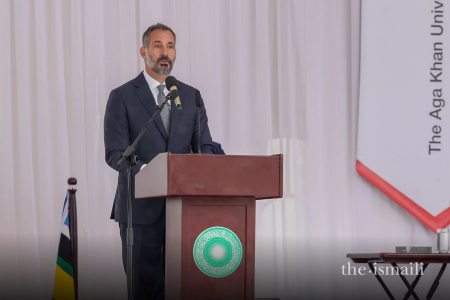Speech by His Highness the Aga Khan at the 2026 AKU Convocation 2026-01-17
Bismillah-ir-Rahman-ir-Rahim
Pro-Chancellor Princess Zahra Aga Khan,
Chair Zakir Mahmood and Members of the Board of Trustees,
Chairs and members of the Kenya and Uganda University Councils,
President and Vice-Chancellor Sulaiman Shahabuddin,
Leaders, faculty, staff, students, alumni, and friends of the University,
Family members of the graduates,
Members of the Class of 2025:
The Aga Khan University has many proud accomplishments to its name, but none is more significant than the one we celebrate each year at Convocation. It gives me great happiness, as Chancellor, to congratulate the graduates of the Aga Khan University across all of our campuses, including Uganda, Tanzania, Kenya, the United Kingdom, Afghanistan and Pakistan. This is an important milestone for each of you—and I am confident it will be followed by many outstanding achievements in your lives.
I am also delighted about Princess Zahra’s installation as Pro-Chancellor of the Aga Khan University and I am deeply grateful for her dedicated leadership of the University over many years.
A strongly held belief in the power of education to change lives and societies has been a defining thread across the history of the Ismaili Imamat—from the founding of Al-Azhar in the tenth century, to the establishment of Aligarh Muslim University, the Aga Khan University, and the University of Central Asia in the twentieth century, and the network of more than 200 Aga Khan Schools educating young people across diverse societies today.
It is this enduring conviction that places education at the very heart of the Aga Khan Development Network’s mission. When we educate an individual, we do not merely confer a personal asset that can never be taken away; we set in motion a powerful ripple effect that extends to families and communities. Education amplifies impact—our own and that of our partners—by making our efforts across health, education, social development, livelihood enhancement, and cultural preservation more effective, more efficient, and more sustainable. Through those we educate and through the knowledge we generate, we seek to help communities overcome persistent challenges and build more pluralistic, safe, and productive societies.
Over the past four decades, the validity of this conviction has been repeatedly affirmed by the achievements of the Aga Khan University’s faculty, staff, and alumni, and by their impact across health, education, and development. It has also been strengthened by the support we have received from many quarters: from our donors, whose generosity reflects a deep confidence in the University’s vision and mission; from our volunteers and partners, who have helped extend AKU’s reach and capacity; from our Trustees, whose wisdom guides us through change; and from governments, which have created enabling environments in which the University can thrive.
This background helps to explain why the word that resonates most profoundly on this occasion is opportunity.
Never before have we known so much about nature and humanity. Never before have the tools of scholarship and science been so powerful—from gene editing to artificial intelligence, and from climate science to data-driven innovation. This moment therefore places upon the Aga Khan University and its graduates both an extraordinary responsibility and an extraordinary opportunity: to create, to disseminate, and to apply knowledge in ways that improve the quality of human life.
The Class of 2025 must not miss that opportunity. Nor will it—because it has been prepared for this moment with care and rigour.
In that spirit, I wish to acknowledge the distinguished, world-class faculty of the Aga Khan University, whose deep commitment to excellence in teaching and sustained engagement in rigorous, cutting-edge research shape the intellectual life of the University and enrich the learning experience of our students every day.
This is an exciting time for our University as we embrace the opportunity to advance research, leverage technological innovation, promote virtual learning, demonstrate environmental leadership, and deepen our commitment to pluralism, partnership, and excellence. These goals are both timely and essential for our continued growth and impact.
Graduates, I pray that you will seize the opportunity to bring knowledge to bear on the challenges facing your communities. In doing so, you will demonstrate the power of a great education and confirm that the tradition AKU embodies has never been more vital.
Congratulations once again and thank you.
- 270 reads
 Ismaili.NET - Heritage F.I.E.L.D.
Ismaili.NET - Heritage F.I.E.L.D.